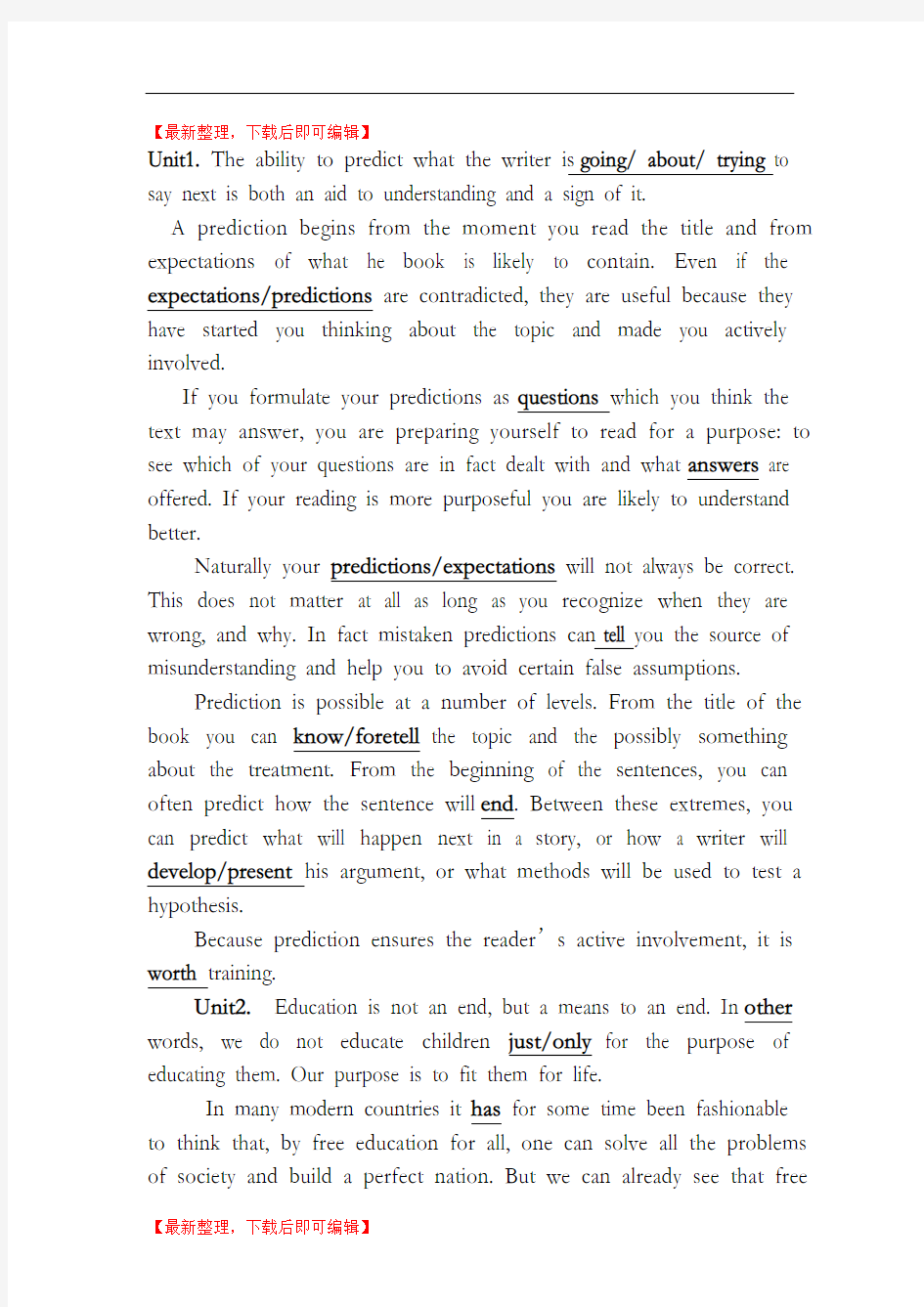
泛读教程 第三册 cloze 答案 原文(精品资料).doc
- 格式:doc
- 大小:58.00 KB
- 文档页数:12


【最新整理,下载后即可编辑】
Unit1. The ability to predict what the writer is going/ about/ trying to say next is both an aid to understanding and a sign of it.
A prediction begins from the moment you read the title and from expectations of what he book is likely to contain. Even if the expectations/predictions are contradicted, they are useful because they have started you thinking about the topic and made you actively involved.
If you formulate your predictions as questions which you think the text may answer, you are preparing yourself to read for a purpose: to see which of your questions are in fact dealt with and what answers are offered. If your reading is more purposeful you are likely to understand better.
Naturally your predictions/expectations will not always be correct. This does not matter at all as long as you recognize when they are wrong, and why. In fact mistaken predictions can tell you the source of misunderstanding and help you to avoid certain false assumptions.
Prediction is possible at a number of levels. From the title of the book you can know/foretell the topic and the possibly something about the treatment. From the beginning of the sentences, you can often predict how the sentence will end. Between these extremes, you can predict what will happen next in a story, or how a writer will develop/present his argument, or what methods will be used to test a hypothesis.
Because prediction ensures the reader’s active involvement, it is worth training.
cation is not an end, but a means to an end. In other words, we do not educate children just/only for the purpose of educating them. Our purpose is to fit them for life.
In many modern countries it has for some time been fashionable to think that, by free education for all, one can solve all the problems of society and build a perfect nation. But we can already see that free
education for all is not enough; we find in some/many countries a far larger number of people with university degrees than there are jobs for them to fill. Because of their degrees, they refuse to do what they think to be "low" work, and, in fact, work with hands is thought to be dirty and shameful in such countries.
But we have only to think a moment to see/know/understand that the work of a completely uneducated farmer is far more important than that of a professor. We can live without education, but we die if we have no food. If no one cleaned our streets and took the rubbish away from our houses, we should get terrible diseases in our towns.
In fact, when we say that all of us must be educated to fit ourselves for life, it means that we must be ready/willing/educated/taught to do whatever job suited to our brain and ability, and to realize that all jobs are necessary to society, that is very wrong/incorrect/erroneous to be ashamed of one's work or to scorn someone else’s. Only such a type of education can be called valuable to society.
Unit3. Human beings learn to communicate with each other will nonlinguistic means as well as linguistic ways/means/ones. All of us are familiar with the say it wasn’t what he said; it was the way that he said it when, by using/saying the word way we mean something about the particular vice quality that was in evidence., or the set of a shoulder, or the obvious tension of certain muscles. A message may even be sent by the accompanying tone and gestures, so that each of I’m ready, you are beautiful, and I don’t know where he is can mean the opposite of any such interpretation. Often we have/meet/encounter/experience difficulty in finding exactly what in the communication causes the change of meaning, and any statement we make leads to the source of the gap between the literal meaning of the words and the total message that is likely to be expressed in impressionistic terms. It is likely to refer to some thing like a “glint”